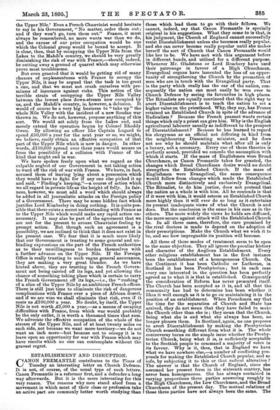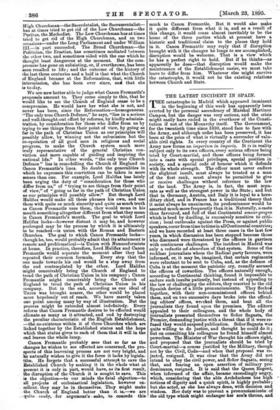ESTABLISHMENT AND DISRUPTION.
CANON FREMANTLE contributes to the Times of Tuesday an interesting letter on Church Defence. It is not, of course, of the usual type of such letters. Canon Fremantle is a reformer first, and a defender a long way afterwards. But it is the more interesting for this very reason. The reasons why men stand aloof from a movement in which most of their class or profession take an active part are commonly better worth studying than those which lead them to go with their fellows. We cannot, indeed, say that Canon Fremantle is specially original in his suggestions. What they come to is that, in his judgment, the Church of England cannot successfully resist Disestablishment unless she becomes really popular, and she can never become really popular until she makes herself the sort of Church that Canon Fremantle would like her to be. We have met with this argument before in different hands, and utilised for a different purpose. Whenever Mr. Gladstone or Lord Rosebery have used their patronage in favour of a High Churchman, Evangelical organs have lamented the loss of an oppor- tunity of strengthening the Church by the promotion of men who are in touch with the Evangelical party. That is the party which really has the ear of the nation, con- sequently the nation can most easily be won over to Church Defence by seeing its favourites in high places. The Ritualists are equally convinced that the right way to avert Disestablishment is to teach the nation to set a higher value on the priesthood. Why, they say, has France retained an Established Church in spite of the advance of Radicalism ? Because the French peasant wants certain things which only a priest can give him. Why is the English agricultural labourer usually so indifferent to the prospect of Disestablishment ? Because he has learned to regard his clergyman as an official not differing in kind from the neighbouring Dissenting minister, and he does not see why he should maintain what after all is only a luxury, not a necessary. Every one of these theories is perfectly sound, provided we concede the assumption with which it starts. If the mass of Englishmen were Broad Churchmen, as Canon Fremantle takes for granted, the changes which Broad Churchmen desire would no doubt strengthen the Established Church. If the mass of Englishmen were Evangelical, the same consequence would follow from changes which made the Established Church more distinctively and exclusively Evangelical. The Ritualist, to do him justice, does not pretend that the nation as a whole is with him. All he contends is that if it were with him, it would esteem an Established Church more highly than it will ever do so long as it entertains its present inadequate views of what the Church is and does. But the conclusion is the same in his case as in the others. The more widely the views he holds are diffused, the more secure against attack will the Established Church be. In all three cases, therefore, the cure promised by the rival doctors is made to depend on the adoption of their prescriptions. Make the Church what we wish it to be, and see how impregnable its position will become.
All three of these modes of treatment seem to be open to the same objection. They all ignore the peculiar history and character of the Anglican Establishment. Every other religious establishment has in the first instance been the establishment of a homogeneous Church. On the Continent it has been Catholic or Lutheran, in Scotland it has been Presbyterian; but in each case every one interested in the question has been perfectly agreed as to what it is that is established. Consequently the consideration of Reform has never presented itself. The Church has been accepted as it is, and all that the community has had to determine has been whether it likes it well enough as it is to go on maintaining it in the position of an establishment. When Frenchmen say that the time for the separation of Church and State has arrived, they do not mean that they have failed to make the Church other than she is ; they mean that the Church, being what she is and what she always has been, no longer pleases them. In Scotland, again, no one proposes to avert Disestablishment by making the Presbyterian Church something different from what it is. The whole controversy turns on the simple issue whether the Presby- terian Church, being what it is, is sufficiently acceptable to the Scottish people to command a majority of votes in its favour. Why is it, then, that in England we have what we have nowhere else,—a number of conflicting pro- posals for making the Established Church popular, and so safe, by subjecting it to this or that radical alteration ? The answer is that the Church of England, since she assumed her present form in the sixteenth century, has never been homogeneous. She has always contained in varying proportions three parties answering roughly to the High Churchmen, the Low Churchmen, and the Broad Churchmen of the present day. The mutual relations of these three parties have not always been the same. The High Churchman—the Swerdotalist, the Sacramentalist— has at times tried to get rid of the Low Churchman—the Puritan, the Methodist. The Low Churchman has at times tried to get rid of the High Churchman, and on two occasions—under the Long Parliament and under William III.—in part succeeded. The Broad Churchman—the Politician, the Erastian, has sometimes mediated between the other two, and sometimes sided with the one which he thought least dangerous at the moment. But the com- promise has gone on subsisting, or, if overthrown, has been soon recalled to life ; and the outcome of the history of the last three centuries and a half is that what the Church of England became at the Reformation, that, with little intermission, she has been ever since, and. that she is to-day.
We are now better able to judge what Canon Fremantle's proposals amount to. They come simply to this, that he would like to see the Church of England cease to be a compromise. He would have her what she is not, and never has been, since the Reformation—homogeneous. "The only true Church Defence," he says, "lies in a serious and well-thought-out effort by reforms, by kindly adminis- tration, by consideration for those who differ from us by trying to see things from their point of view, by going as far in the path of Christian Union as our principles will possibly allow, by winning not the submission but the co-operation of all good men in religious and social progress, to make the Church system much more truly representative of the general Christian con- viction and more capable of guiding and inspiring the national life." In other words, "the only true Church Defence" lies in remodelling the Church of England on Canon Fremantle's lines. No doubt the generalities in which he expresses this conviction can be taken in more senses than one. For example, Lord Halifax has lately been urging the duty of "consideration for those who differ from us," of "trying to see things from their point of view," of "going as far in the path of Christian Union as our principles will possibly allow." But though Lord Halifax would make all these phrases his own, and use them with quite as much sincerity and quite as much truth as Canon Fremantle uses them, they would mean in his mouth something altogether different from what they mean in Canon Fremantle's mouth. The goal to which Lord Halifax looks—however distant it may be, and however prolonged may be the process by which it is ultimately to be reached—is union with the Roman and Eastern Churches. The goal to which Canon Fremantle looks— though he, too, would probably admit that its attainment is remote and problematical—is Union with Nonconformists at home. In practice, therefore, Lord Halifax and Canon Fremantle would separate the moment after they had repeated their common formula. Every step that the one made towards his end would be a step away from the end contemplated by the other. Lord Halifax might conceivably bring the Church of England to tread the path of Christian Union in his company ; Canon Fremantle might conceivably bring the Church of England to tread the path of Christian Union in his company. But in the end, according as one ideal of Union was brought nearer, the other would be placed more hopelessly out of reach. We have merely taken one point among many by way of illustration. But the process might be extended almost indefinitely. Every reform that Canon Fremantle desires to be effected would alienate as many as it attracted, and end by destroying the peculiar characteristic of the English Establishment, —the co-existence within it of three Churches which are linked together by the Established status and the hope which that status gives to each of them that it will in the end leaven the whole lump.
Canon Fremantle probably sees that so far as the changes he wishes to see effected are concerned, the pro- spects of this leavening process are not very bright, and he naturally wishes to give it the force it lacks by legisla- tibn. He forgets that a successful attempt to save the Established Church by making it in the whole what at present it is only in part, would have, as its first result, the disruption of the Church it is sought to save. This is the objection—to our minds the fatal objection—to all projects of ecclesiastical legislation, however ex- cellent , they may be in themselves. They might make the Church of England better than it is,—we are quite ready, for argument's sake, to concede this. much to Canon Fremantle. But it would also make it quite different from what it is, and as a result of this change, it would cease almost inevitably to be the home of the three parties which at present have a historic and traditional claim to the places they hold in it. Canon Fremantle may reply that if disruption brought with it the changes he longs to see accomplished, disruption would be welcome. That is a view which he has a perfect right to hold. But if he thinks—as apparently he does—that disruption would make the maintenance of the Establishment easier, we must take leave to differ from him. Whatever else might survive the catastrophe, it would not be the existing relations between Church and State.







































 Previous page
Previous page